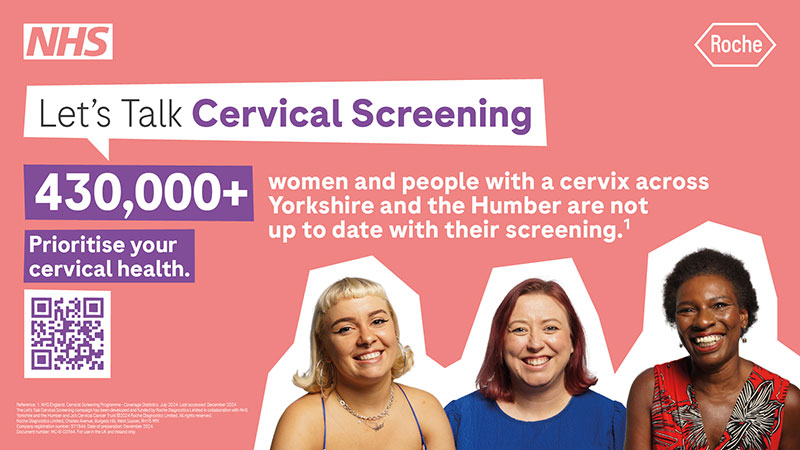
Let’s talk Cervical Screening 430,000+ women and people with a cervix across Yorkshire and the Humber are not up to date with their screening.'
Let’s talk Cervical Screening
Cervical screening - or the smear test - is a free health check available on the NHS throughout the UK.2
It checks the health of the cervix, the opening to the womb from the vagina,3 and it’s one of the best ways to protect yourself from cervical cancer.4
It’s not a test for cervical cancer, but helps to prevent the disease.4
What’s the story with HPV?
Cervical screening checks for high-risk types of a virus called human papillomavirus (HPV).4,5 High-risk types of HPV infection – which often have no symptoms – can cause abnormal changes to the cells in your cervix which if left untreated, might turn into cervical cancer over time.4,5
There are more than 200 types of HPV, and in most cases, they’re harmless. However, HPV infections, particularly high-risk types, can lead to the development of cancer.5
You can get HPV from any kind of sexual contact, whether penetrative (e.g., vaginal, anal) or not (e.g., oral sex, genital touching, shared use of sex toys).4,5
Most sexually active adults will get HPV at some point in their lives.4,5 It’s common, and nothing to feel ashamed or embarrassed about.4
Who’s cervical screening for?
Women and people with a cervix (including trans men, non-binary and intersex people), from the ages of 25 to 64 years old.2,3
As long as you haven’t changed your gender marker in your NHS records, you’ll automatically get an invitation letter in the post when it’s your time to book.2,3
Let’s talk top tips for cervical screening
Beforehand
There are some things which you can do to make you feel more comfortable:
- Consider asking for a doctor or nurse of a particular gender6
- Ask for the first appointment of the day to reduce your waiting time6
- Request a longer appointment so you have more time to ask questions6
- Take a friend, family member or partner with you6
- Wear clothing that you’re comfortable in and only have to remove what you want to6
- Try to go to the toilet before so you’re not clenching or feeling fidgety7
During
- Ask for a smaller speculum6
- Put the speculum in yourself6
- Change position if you’re feeling discomfort,6 or see if the speculum can be inserted more slowly7
- Think of something to distract you or listen to music7
- Take control of your breathing7
- Ask your doctor or nurse to talk you through what’s happening7
After
- Wear a sanitary pad or panty-liner as you may experience some light bleeding (spotting) the day after8
- Take a paracetamol or ibuprofen to ease any discomfort7
- Speak to your GP if you have any concerns, or contact Ask Eve (0808 802 0019), if you have further support needs
Let’s talk booking your cervical screening
Once you’ve received an invitation letter from the NHS in the post,9 you can book your cervical screening by contacting your GP surgery over the phone, or sometimes online.3
In some areas, you can choose to contact your local sexual health clinic to book or go to a walk-in
centre.9
You should still make an appointment if you…
- Haven’t had sex before, for a long time, or have only had one partner4,5
- You’re in an LGBTQI+ relationship4,6
- Had a partial hysterectomy whereby the cervix isn’t removed4
- Have missed your previous consultation9
- Think you’re due your cervical screening but haven’t been sent a letter, or have lost your invite9
- Asked to be taken off the NHS invite list – simply request to be put back on again4
- Aren’t registered with a GP
- Have been vaccinated against HPV4
Take action!
References:
- NHS England. Cervical Screening Programme - Coverage Statistics. July 2024. Last accessed: December 2024
- NHS. Cervical Screening. Available at: www.nhs.uk/conditions/cervical-screening Last accessed: December 2024
- NHS. What is cervical screening? Available at: www.nhs.uk/conditions/cervical-screening/what-is-cervical-screening/ Last accessed: December 2024
- NHS. Why cervical screening is important. Available at: www.nhs.uk/conditions/cervical-screening/why-its-important/ Last accessed: December 2024
- Cancer Research UK. Let’s talk about HPV: 6 common questions answered. Available at: https://news.cancerresearchuk.org/2021/06/16/lets-talk-about-hpv-6-common-questions-answered/ Last accessed: December 2024
- The Eve Appeal. Facts and tips for cervical screening. Available at: https://eveappeal.org.uk/gynaecological-cancers/cervical-cancer/facts-and-tips-for-cervical-screening/ Last accessed: December 2024
- The Gynae Centre. 8 tips for making your smear test more comfortable. Available at: https://www.gynae-centre.co.uk/blog/8-tips-for-making-your-smear-test-more-comfortable/ Last accessed: December 2024
- NHS. What happens at your cervical screening appointment. Available at: https://www.nhs.uk/conditions/cervical-screening/what-happens/ Last accessed: December 2024
- NHS. How to book cervical screening. Available at: www.nhs.uk/conditions/cervical-screening/how-to-book/ Last accessed: December 2024
The Let’s Talk Cervical Screening campaign has been developed and funded by Roche Diagnostics Limited in collaboration with NHS Yorkshire and the Humber.
©2024 Roche Diagnostics Limited. All rights reserved. Roche Diagnostics Limited, Charles Avenue, Burgess Hill, West Sussex, RH15 9RY. Company registration number: 571546.
Date of preparation: December 2024. Document number: MC-IE-02942. For use in the UK and Ireland only